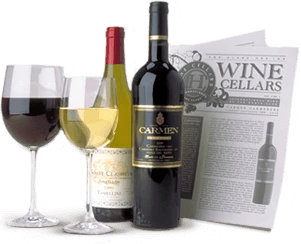Ripe, round, and buttery, the 2000 Bishop's Peak Central Coast Chardonnay was made with good old-fashioned drinking in mind. No smoke, no mirrors, this is a Chardonnay made for those who appreciate the luscious, more hedonistic side of California Chardonnay; the Bishop's Peak is not for the "oak crowd" or those who worship toasted oak barrels as the supreme expression of a wine. Rather, this Central Coast Chardonnay displays a lovely, natural, fruit-driven personality. It's not that the folks at Bishop's Peak decided to leave out the oak on this lovely offering, it is simply that oak is not the "raison d'etre" of their Chardonnay. Instead, there are deft touches of oak in the Bishop's Peak, which imbue the wine with roundness and a subtle framework rather than overwhelm it with vanillin. What a welcome relief. Enjoy this very guzzable Chardonnay moderately chilled.
While enjoyable all by itself, the 2000 Bishop's Peak is even better with food, especially seafood and poultry. We recommend you try this wine with either grilled Mahi-Mahi in a mango chutney or roast duck with an apricot glaze. The wine's fragrant aroma of citrus, fresh baked bread and Asian pear nicely complement fruit based sauces, adding an extra dimension to the fish or chicken in the sauce. We also suggest that you try the Bishop's Peak Chardonnay with scallop dishes, as the broad, clean flavors of fresh scallops provide a superb accompaniment to the hedonistic side of this wine, while the wine's crisp finish accentuates the fresh, flavorful aspects of the scallops. Another great complement to the Bishop's Peak is a baked Brie, with either an apricot or pear compote. As always, enjoy this wine as you like it.
Located halfway between San Francisco and Los Angeles on California's South Central Coast, Bishop's Peak is an ancient volcano that towers above the city of San Luis Obispo. It is the tallest of a series of volcanic peaks, "the Seven Sisters" that line the Los Osos Valley and continue into the Edna Valley from Morro Bay. It is one of the most important landmarks in San Luis Obispo County. The Talley family, farmers in the area for three generations, along with winemaker Steve Rasmussen, chose Bishop's Peak to convey their commitment to the production of hand crafted wines that best express San Luis Obispo County's unique winegrowing conditions. The Talley family and Steve Rasmussen are probably best known for their exclusive single vineyard Chardonnay and Pinot Noir offerings under the Talley name, but unknown to most consumers, Bishop's Peak is the other piece to their family's legacy. Unable to produce additional quantities or varietals other than Chardonnay or Pinot Noir, at their Central Coast estate, the Talley family has set out to produce a limited amount of Chardonnay and other wines from small growers in the Central Coast. These wines are made at Talley from the fruit of growers who, like the Talley's, prune away excess yields, limit or eschew the use of herbicides and pesticides, and wait to pick their fruit at the peak of ripeness. The majority of Bishop's Peak production is divided between Chardonnay from the cooler regions of southern San Luis Obispo County and a Rhone blend from the warmer reaches of Paso Robles to the north. The Talley's and their award winning winemaker, Steve Rasmussen, use all the same winemaking techniques for Bishop's Peak that they employ for Talley wines, including hand harvesting of all of the fruit, whole cluster pressing, minimal processing, native yeast fermentation and real oak barrels. There are no shortcuts or tricks, like oak chips or flavoring agents, used in making Bishop's Peak; and in the case of the Bishop's Peak Chardonnay, half of the wine is actually barrel fermented and the entire production undergoes malolactic fermentation (the conversion of the wine's harder malic acid to the natural, softer lactic acid). You will notice one special and quite unique attribute when you pull the cork of a bottle of Bishop's Peak wine - the cork itself. What may appear to be a synthetic cork is really a special "cork" called Altec. It was developed by the supplier Sabate, one of the largest purveyors of cork in France and California. They developed this cork to eliminate TCA (corkiness) by granulating the bark of the cork oak tree, removing all of the woody lignins which can cause TCA and binding together the remaining suber (spongy material). The Altec cork is the best, most natural alternative to standard corks available today. We would not be surprised to see more concerned producers using this product in the next few years. It is safer than the standard cork, but more aesthetically pleasing than either a plastic cork or a screw cap. Have we found the solution to the centuries old dilemma posed by the cork stopper?

Enjoy Limited Production Estate
Bottled Wines
Discover limited production estate bottled wines such as Vergenoegd's internationally
acclaimed 2005 Cabernet Sauvignon, imported exclusively for our members.

